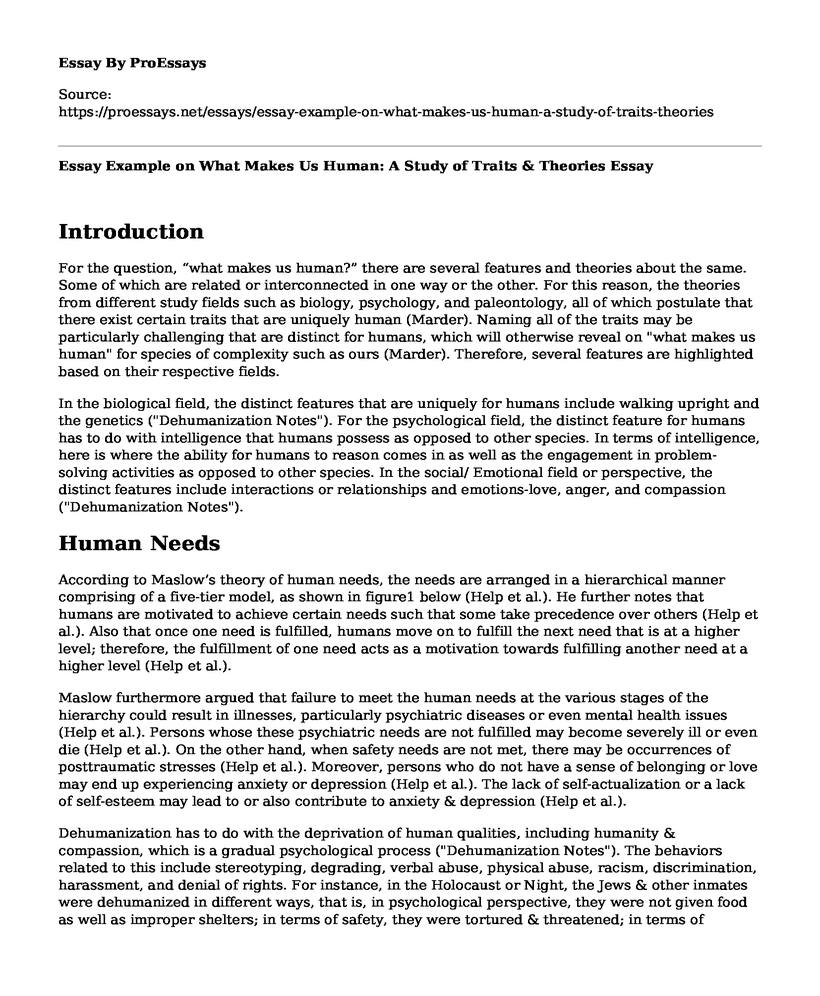Introduction
For the question, “what makes us human?” there are several features and theories about the same. Some of which are related or interconnected in one way or the other. For this reason, the theories from different study fields such as biology, psychology, and paleontology, all of which postulate that there exist certain traits that are uniquely human (Marder). Naming all of the traits may be particularly challenging that are distinct for humans, which will otherwise reveal on "what makes us human" for species of complexity such as ours (Marder). Therefore, several features are highlighted based on their respective fields.
In the biological field, the distinct features that are uniquely for humans include walking upright and the genetics ("Dehumanization Notes"). For the psychological field, the distinct feature for humans has to do with intelligence that humans possess as opposed to other species. In terms of intelligence, here is where the ability for humans to reason comes in as well as the engagement in problem-solving activities as opposed to other species. In the social/ Emotional field or perspective, the distinct features include interactions or relationships and emotions-love, anger, and compassion ("Dehumanization Notes").
Human Needs
According to Maslow’s theory of human needs, the needs are arranged in a hierarchical manner comprising of a five-tier model, as shown in figure1 below (Help et al.). He further notes that humans are motivated to achieve certain needs such that some take precedence over others (Help et al.). Also that once one need is fulfilled, humans move on to fulfill the next need that is at a higher level; therefore, the fulfillment of one need acts as a motivation towards fulfilling another need at a higher level (Help et al.).
Maslow furthermore argued that failure to meet the human needs at the various stages of the hierarchy could result in illnesses, particularly psychiatric diseases or even mental health issues (Help et al.). Persons whose these psychiatric needs are not fulfilled may become severely ill or even die (Help et al.). On the other hand, when safety needs are not met, there may be occurrences of posttraumatic stresses (Help et al.). Moreover, persons who do not have a sense of belonging or love may end up experiencing anxiety or depression (Help et al.). The lack of self-actualization or a lack of self-esteem may lead to or also contribute to anxiety & depression (Help et al.).
Dehumanization has to do with the deprivation of human qualities, including humanity & compassion, which is a gradual psychological process ("Dehumanization Notes"). The behaviors related to this include stereotyping, degrading, verbal abuse, physical abuse, racism, discrimination, harassment, and denial of rights. For instance, in the Holocaust or Night, the Jews & other inmates were dehumanized in different ways, that is, in psychological perspective, they were not given food as well as improper shelters; in terms of safety, they were tortured & threatened; in terms of love/belonging, there was the loss of relationships, in terms of esteem, they worked in mundane or appalling environments, while in terms of self-actualization, they were not given opportunities to realize their potential ("Dehumanization Notes").
When asking how all the above could have happened, the connection to Night is highlighted, which leads to propaganda analysis ("Dehumanization Notes"). In this case, propaganda has to do with the spreading of information with the ultimate aim of manipulating the opinions of the general public to gain back-up or support for an individual's cause. It includes biased information, information being true, partially true, or blatantly false, the complexity of issues/ideas, symbols, words, images, or music ("Dehumanization Notes"). Propaganda techniques include a testimonial, bandwagon, plain folks, name-calling, glittering generalities, card/fear stacking, and transfers ("Dehumanization Notes"). Testimony has to do with the endorsements that aim at connecting famous persons with products or ideas to sell the products or ideas; the bandwagon has to do with the desire of an individual to be on the winning side, plain folks do with the attempts aimed at convincing the public that the ideas or views have reflections of common people, name-calling involves an attempt of arousing prejudice among the people through labeling of the target which the public dislikes, glittering generalities involves appealing emotional words invoking powerful emotions including glory, honor, freedom, and love of country, card stacking involves presentation of information that is positive then omitting information contrary to it, while, transfer consists of the transfer of negative feelings for a particular object to another ("Dehumanization Notes").
Works cited
Marder, Lisa. "Important Features That Separate Humans From Other Species". Thoughtco, 2020, https://www.thoughtco.com/what-makes-us-human-4150529.
Help, Get et al. "Maslow's Hierarchy Of Needs - Goodtherapy.Org Therapy Blog". Goodtherapy.Org Therapy Blog, 2020, https://www.goodtherapy.org/blog/psychpedia/maslow-hierarchy-needs.
"Dehumanization Notes". 2020.
Cite this page
Essay Example on What Makes Us Human: A Study of Traits & Theories. (2023, Aug 13). Retrieved from https://proessays.net/essays/essay-example-on-what-makes-us-human-a-study-of-traits-theories
If you are the original author of this essay and no longer wish to have it published on the ProEssays website, please click below to request its removal:
- Causes of Being by Aristotle
- Critical Response to Plato's Gorgias and Phaedrus Paper Example
- How Sociology Enables One Understand Themselves and the Social World Essay
- Cultural & Moral Relativism: Understanding Diverse Lives & Moral Judgments - Essay Sample
- Essay Example on Managers: Embracing Ethics for Long-Term Success
- Essay Example on COVID-19: One Million Infected in Under Three Months
- Free Paper Sample: Canon's Code of Ethics







